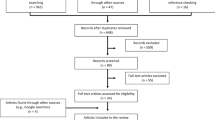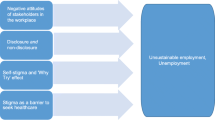Abstract
Purpose Since the vocational outcomes of people with schizophrenia should be viewed in a holistic way, the second edition of the World Health Organization Disability Assessment Schedule (WHODAS 2.0) might provide an evaluation regarding employment potential. To determine whether the WHODAS 2.0 scores can be used to predict employment status, we examined the probabilistic cut-off values of the scores and analyzed the relationship between work status and demographic characteristics. Methods We selected 31,793 people aged between 18 and 65 with schizophrenia or schizoaffective disorder from the disability evaluation database in Taiwan and separated them into two groups based on employment status (employed and unemployed). We used logistic regression to explore the association between employment and demographic characteristics. Moreover, we conducted a receiver operating characteristic (ROC) analysis to determine the cut-off point to assist in determining employment potential based on the WHODAS 2.0 score. Results Among the 31,793 participants, 3367 were employed and 18,801 were unemployed. The unemployed participants accounted for a higher percentage of disability in each domain of the WHODAS. The ROC analysis revealed that the optimal cut-off point of the WHODAS score to distinguish the people who were employed and unemployed was 25.78 (area under curve = 0.80). Conclusions The present study indicated that work status can be determined by the total score across the six domains of the WHODAS score. Furthermore, the probability of employment may be determined initially by the cut-off point of the WHODAS score in order to economize evaluation time and prepare prevocational training for those with scores above 25.78.


Similar content being viewed by others
References
Ormel J, Petukhova M, Chatterji S, Aguilar-Gaxiola S, Alonso J, Angermeyer MC, et al. Disability and treatment of specific mental and physical disorders across the world. Br J Psychiatry. 2008;192(5):368–375. https://doi.org/10.1192/bjp.bp.107.039107 (PubMed PMID: 18450663; PubMed Central PMCID: PMCPMC2681238).
Gupta M, Holshausen K, Mausbach B, Patterson TL, Bowie CR. Predictors of change in functional competence and functional behavior after functional adaptation skills training for schizophrenia. J Nerv Ment Dis. 2012;200(8):705–711. https://doi.org/10.1097/Nmd.0b013e3182613f79.
Farkas M. The vision of recovery today: what it is and what it means for services. World Psychiatry. 2007;6(2):4–10.
Silverstein SM, Bellack AS. A scientific agenda for the concept of recovery as it applies to schizophrenia. Clin Psychol Rev. 2008;28(7):1108–1124. https://doi.org/10.1016/J.Cpr.2008.03.004.
Pachoud B, Plagnol A, Leplege A. Outcome, recovery and return to work in severe mental illnesses. Disabil Rehabil. 2010;32(12):1043–1050. https://doi.org/10.3109/09638281003775618 (PubMed PMID: 20450409).
Boyer L, Aghababian V, Richieri R, Loundou A, Padovani R, Simeoni MC, et al. Insight into illness, neurocognition and quality of life in schizophrenia. Prog Neuropsychopharmacol Biol Psychiatry. 2012;36(2):271–276. https://doi.org/10.1016/j.pnpbp.2011.10.008 (PubMed PMID: 22019603).
Ucok A, Gorwood P, Karadayi G, Egofors. Employment and its relationship with functionality and quality of life in patients with schizophrenia: EGOFORS study. Eur Psychiatry. 2012;27(6):422–425. https://doi.org/10.1016/j.eurpsy.2011.01.014 (PubMed PMID: 21592736).
Marwaha S, Johnson S. Schizophrenia and employment: a review. Soc Psychiatry Psychiatr Epidemiol. 2004;39(5):337–349. https://doi.org/10.1007/s00127-004-0762-4 (PubMed PMID: 15133589).
Cook JA, Razzano L. Vocational rehabilitation for persons with schizophrenia: recent research and implications for practice. Schizophr Bull. 2000;26(1):87–103 (PubMed PMID: 10755671).
Anthony WA, Rogers ES, Cohen M, Davies RR. Relationships between psychiatric symptomatology, work skills, and future vocational performance. Psychiatr Serv. 1995;46(4):353–358.
Burke-Miller JK, Cook JA, Grey DD, Razzano LA, Blyler CR, Leff HS, et al. Demographic characteristics and employment among people with severe mental illness in a multisite study. Community Ment Health J. 2006;42(2):143–159. https://doi.org/10.1007/s10597-005-9017-4 (PubMed PMID: 16404685).
Catty J, Lissouba P, White S, Becker T, Drake RE, Fioritti A, et al. Predictors of employment for people with severe mental illness: results of an international six-centre randomised controlled trial. Br J Psychiatry. 2008;192(3):224–231. https://doi.org/10.1192/bjp.bp.107.041475 (PubMed PMID: 18310585).
Hoffmann H, Kupper Z, Zbinden M, Hirsbrunner HP. Predicting vocational functioning and outcome in schizophrenia outpatients attending a vocational rehabilitation program. Soc Psychiatry Psychiatr Epidemiol. 2003;38(2):76–82. https://doi.org/10.1007/s00127-003-0603-x (PubMed PMID: 12563549).
McGurk SR, Mueser KT. Cognitive functioning, symptoms, and work in supported employment: a review and heuristic model. Schizophr Res. 2004;70(2–3):147–173. https://doi.org/10.1016/j.schres.2004.01.009 (PubMed PMID: 15329293).
Nuechterlein KH, Subotnik KL, Green MF, Ventura J, Asarnow RF, Gitlin MJ, et al. Neurocognitive predictors of work outcome in recent-onset schizophrenia. Schizophr Bull. 2011;37(Suppl 2):S33–S40. https://doi.org/10.1093/schbul/sbr084 (PubMed PMID: 21860045; PubMed Central PMCID: PMCPMC3160123).
Tsang HWH, Leung AY, Chung RCK, Bell M, Cheung WM. Review on vocational predictors: a systematic review of predictors of vocational outcomes among individuals with schizophrenia: an update since 1998. Aust N Z J Psychiatry. 2010;44(6):495–504.
Hoffmann H, Kupper Z. Relationships between social competence, psychopathology and work performance and their predictive value for vocational rehabilitation of schizophrenic outpatients. Schizophr Res. 1997;23(1):69–79. https://doi.org/10.1016/S0920-9964(96)00082-5.
Lysaker P, Bell M. Work performance over time for people with schizophrenia. Psychosoc Rehabil J. 1995;18(3):141–145.
Couture SM, Penn DL, Roberts DL. The functional significance of social cognition in schizophrenia: a review. Schizophr Bull. 2006;32(Suppl 1):S44–S63. https://doi.org/10.1093/schbul/sbl029 (PubMed PMID: 16916889; PubMed Central PMCID: PMCPMC2632537).
Heinrichs RW, Zakzanis KK. Neurocognitive deficit in schizophrenia: a quantitative review of the evidence. Neuropsychology. 1998;12(3):426–445. https://doi.org/10.1037/0894-4105.12.3.426.
Schaefer J, Giangrande E, Weinberger DR, Dickinson D. The global cognitive impairment in schizophrenia: consistent over decades and around the world. Schizophr Res. 2013;150(1):42–50. https://doi.org/10.1016/j.schres.2013.07.009 (PubMed PMID: 23911259; PubMed Central PMCID: PMCPMC4196267).
Green MF. What are the functional consequences of neurocognitive deficits in schizophrenia? Am J Psychiatry. 1996;153(3):321–330.
Green MF, Kern RS, Braff DL, Mintz J. Neurocognitive deficits and functional outcome in schizophrenia: are we measuring the “right stuff”? Schizophr Bull. 2000;26(1):119–136.
Tolman AW, Kurtz MM. Neurocognitive predictors of objective and subjective quality of life in individuals with schizophrenia: a meta-analytic investigation. Schizophr Bull. 2012;38(2):304–315. https://doi.org/10.1093/schbul/sbq077 (PubMed PMID: 20624752; PubMed Central PMCID: PMCPMC3283161).
Velligan DI, Mahurin RK, Diamond PL, Hazleton BC, Eckert SL, Miller AL. The functional significance of symptomatology and cognitive function in schizophrenia. Schizophr Res. 1997;25(1):21–31. https://doi.org/10.1016/S0920-9964(97)00010-8.
Dickinson D, Bellack AS, Gold JM. Social/communication skills, cognition, and vocational functioning in schizophrenia. Schizophr Bull. 2007;33(5):1213–1220. https://doi.org/10.1093/schbul/sbl067 (PubMed PMID: 17164469; PubMed Central PMCID: PMCPMC2632341).
Lehman AF. Vocational rehabilitation in schizophrenia. Schizophr Bull. 1995;21(4):645–656.
Rosenheck R, Leslie D, Keefe R, McEvoy J, Swartz M, Perkins D, et al. Barriers to employment for people with schizophrenia. Am J Psychiatry. 2006;163(3):411–417. https://doi.org/10.1176/appi.ajp.163.3.411 (PubMed PMID: 16513861).
Hatch SL, Harvey SB, Maughan B. A developmental-contextual approach to understanding mental health and well-being in early adulthood. Soc Sci Med. 2010;70(2):261–268.
Henderson M, Harvey SB, Overland S, Mykletun A, Hotopf M. Work and common psychiatric disorders. J R Soc Med. 2011;104(5):198–207. https://doi.org/10.1258/jrsm.2011.100231 (PubMed PMID: 21558098; PubMed Central PMCID: PMCPMC3089873).
Cornelius LR, van der Klink JJ, de Boer MR, Groothoff JW, Brouwer S. Predictors of functional improvement and future work status after the disability benefit claim: a prospective cohort study. J Occup Rehabil. 2014;24(4):680–691. https://doi.org/10.1007/s10926-014-9500-2 (PubMed PMID: 24519320).
Gold LH. DSM-5 and the assessment of functioning: the World Health Organization Disability Assessment Schedule 2.0 (WHODAS 2.0). J Am Acad Psychiatry Law. 2014;42(2):173–181 (PubMed PMID: 24986344).
Chiu WT, Yen CF, Teng SW, Liao HF, Chang KH, Chi WC, et al. Implementing disability evaluation and welfare services based on the framework of the international classification of functioning, disability and health: experiences in Taiwan. BMC Health Serv Res. 2013;13(1):416–424. https://doi.org/10.1186/1472-6963-13-416 (PubMed PMID: 24125482; PubMed Central PMCID: PMCPMC3853212).
Teng SW, Yen CF, Liao HF, Chang KH, Chi WC, Wang YH, et al. Evolution of system for disability assessment based on the International classification of functioning, disability, and health: a Taiwanese study. J Formos Med Assoc. 2013;112(11):691–698. https://doi.org/10.1016/j.jfma.2013.09.007 (PubMed PMID: 24099681).
Chiu TY, Yen CF, Chou CH, Lin JD, Hwang AW, Liao HF, et al. Development of traditional Chinese version of World Health Organization disability assessment schedule 2.0 36–item (WHODAS 2.0) in Taiwan: validity and reliability analyses. Res Dev Disabil. 2014;35(11):2812–2820. https://doi.org/10.1016/j.ridd.2014.07.009 (PubMed PMID: 25094056).
Demyttenaere K, Bruffaerts R, Posada-Villa J, Gasquet I, Kovess V, Lepine JP, et al. Prevalence, severity, and unmet need for treatment of mental disorders in the World Health Organization World Mental Health Surveys. JAMA. 2004;291(21):2581–2590. https://doi.org/10.1001/jama.291.21.2581 (PubMed PMID: 15173149).
Kessler RC, Greenberg PE, Mickelson KD, Meneades LM, Wang PS. The effects of chronic medical conditions on work loss and work cutback. J Occup Environ Med. 2001;43(3):218–225 (PubMed PMID: 11285869).
Dahourou DL, Amorissani-Folquet M, Coulibaly M, Avit-Edi D, Meda N, Timite-Konan M, et al. Missed opportunities of inclusion in a cohort of HIV-infected children to initiate antiretroviral treatment before the age of two in West Africa, 2011 to 2013. J Int AIDS Soc. 2016;19(1):20601–20611. https://doi.org/10.7448/IAS.19.1.20601 (PubMed PMID: 27015798; PubMed Central PMCID: PMCPMC4808141).
Jensen J, Sathiyandra S, Rochford M, Jones D, Krishnan V, McLeod K. Work participation among people with disabilities: does the type of disability influence the outcome. Soc Policy J N Z. 2005;24:134–159.
Altshuler L, Tekell J, Biswas K, Kilbourne AM, Evans D, Tang D, et al. Executive function and employment status among veterans with bipolar disorder. Psychiatr Serv. 2007;58(11):1441–1447. https://doi.org/10.1176/ps.2007.58.11.1441.
Krishnadas R, Moore BP, Nayak A, Patel RR. Relationship of cognitive function in patients with schizophrenia in remission to disability: a cross-sectional study in an Indian sample. Ann Gen Psychiatry. 2007;6(1):19–26. https://doi.org/10.1186/1744-859X-6-19 (PubMed PMID: 17663763; PubMed Central PMCID: PMCPMC1976613).
McGurk SR, Mueser KT, Harvey PD, LaPuglia R, Marder J. Cognitive and symptom predictors of work outcomes for clients with schizophrenia in supported employment. Psychiatr Serv. 2003;54(8):1129–1135. https://doi.org/10.1176/appi.ps.54.8.1129 (PubMed PMID: 12883141).
World Health Organization. International classification of functioning, disability and health: ICF. Geneva: World Health Organization; 2001.
Luciano A, Meara E. Employment status of people with mental illness: national survey data from 2009 and 2010. Psychiatr Serv. 2014;65(10):1201–1209. https://doi.org/10.1176/appi.ps.201300335 (PubMed PMID: 24933361; PubMed Central PMCID: PMCPMC4182106).
Henry AD, Lucca AM. Facilitators and barriers to employment: the perspectives of people with psychiatric disabilities and employment service providers. Work. 2004;22(3):169–182 (PubMed PMID: 15156083).
Campbell K, Bond GR, Drake RE, McHugo GJ, Xie H. Client predictors of employment outcomes in high-fidelity supported employment: a regression analysis. J Nerv Ment Dis. 2010;198(8):556–563. https://doi.org/10.1097/NMD.0b013e3181ea1e53.
Dunn EC, Wewiorski NJ, Rogers ES. A qualitative investigation of individual and contextual factors associated with vocational recovery among people with serious mental illness. Am J Orthopsychiatry. 2010;80(2):185–194. https://doi.org/10.1111/j.1939-0025.2010.01022.x.
Arbesman M, Logsdon DW. Occupational therapy interventions for employment and education for adults with serious mental illness: a systematic review. Am J Occup Ther. 2011;65(3):238–246. https://doi.org/10.1001/archpsyc.58.8.763.
Cook JA, Lehman AF, Drake R, McFarlane WR, Gold PB, Leff HS, et al. Integration of psychiatric and vocational services: a multisite randomized, controlled trial of supported employment. Am J Psychiatry. 2005;162(10):1948–1956. https://doi.org/10.1176/appi.ajp.162.10.1948 (PubMed PMID: 16199843).
Chang FH. What are individuals with serious mental illness (SMI) dealing with in a competitive labor market? Two case studies. Work. https://doi.org/10.3233/WOR-141849.
Acknowledgements
The research is funded by the Ministry of Science and Technology of Taiwan (MOST 106-2511-S-002-016-MY2). The authors would like to thank Dr. Ben-Shang Chang, Dr. Ting-Fang Wu, and Kai-Hsiang Chuang for providing technical consultation and help throughout the study.
Author information
Authors and Affiliations
Corresponding author
Ethics declarations
Conflict of interest
The authors declare no conflict of interest.
Rights and permissions
About this article
Cite this article
Lu, SJ., Liou, TH., Yen, CF. et al. Determinants of Employment Outcome for the People with Schizophrenia Using the WHODAS 2.0. J Occup Rehabil 29, 375–383 (2019). https://doi.org/10.1007/s10926-018-9794-6
Published:
Issue Date:
DOI: https://doi.org/10.1007/s10926-018-9794-6




